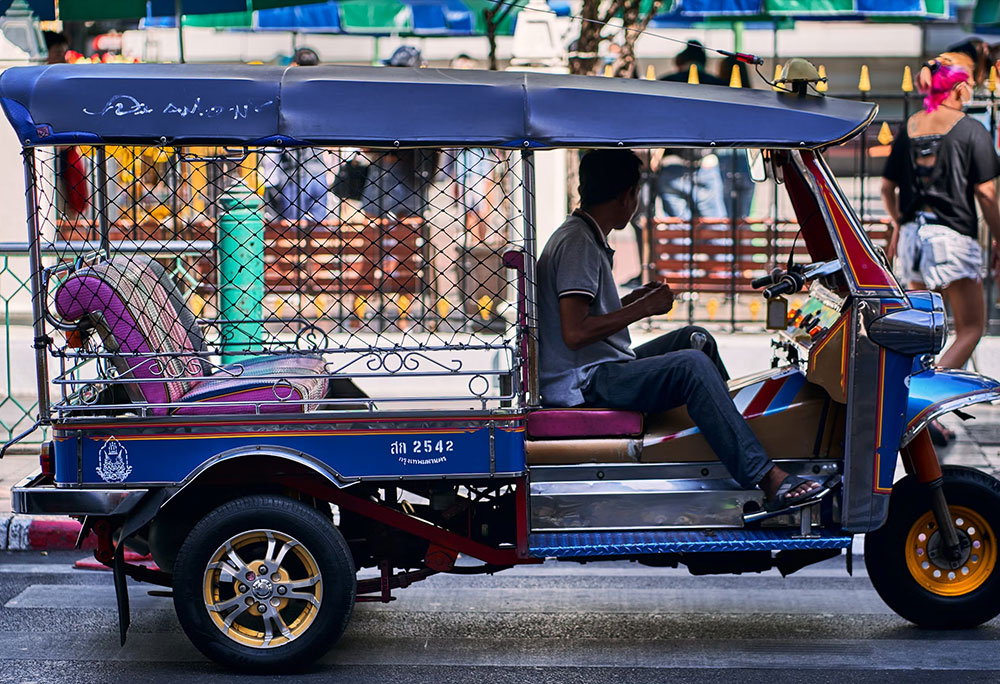Traveling to Thailand promises unforgettable experiences, but amidst the beauty and adventure, scams lurk, preying on unsuspecting tourists. Don’t let these pitfalls mar your cherished memories. Here’s a detailed guide to common scams in Thailand and how you can stay vigilant to enjoy a stress-free trip.
1. The Gem Scam: A Shiny Trap

- Where It Happens: Often near major tourist attractions like the Grand Palace in Bangkok.
- Target Group: Tourists looking for unique, high-value souvenirs or business opportunities.
- How It Works:
Tuk-tuk drivers, taxi operators, or even locals approach you, offering to take you to a “special government-sponsored gem sale.” The gems, often presented as luxury items, are sold with assurances of high resale value abroad. However, these “gems” are typically glass or synthetic, holding no real worth. - Red Flags:
- Overly persistent drivers insisting on a detour.
- Claims of government or royal family sponsorship.
- “Today only” sales pushing urgency.
- How to Avoid the Scam:
- Ignore unsolicited offers and persistent drivers.
- Research and shop only at trusted jewelry stores recommended by reputable sources.
- If you’ve been scammed, file a report with the Thai police and consult an attorney for recovery options.
- Use credit cards for purchases and dispute fraudulent charges immediately if necessary.
2. Tuk-Tuk, Taxi, and Tour Bus Diversions

- Where It Happens: Urban centers like Bangkok and Chiang Mai.
- Target Group: Tourists seeking convenient transportation.
- How It Works:
Drivers offer cheap sightseeing tours or insist on taking you to shops, malls, or restaurants instead of your intended destination. Some tour buses promise visits to specific attractions but fail to deliver or refuse to return you to your hotel. - Red Flags:
- Unusually low fares with vague itineraries.
- Promises of “special deals” or exclusive tours.
- Unwillingness to follow your requested route.
- How to Avoid the Scam:
- Insist on metered taxis or use reliable ride-hailing apps.
- Decline sightseeing offers from random drivers.
- Plan transportation through trusted agencies or public transport systems.
- Verify tour companies’ reputations through online reviews.
3. Jet Ski and Scooter Rental Scams

- Where It Happens: Beach destinations like Phuket, Pattaya, and Koh Samui.
- Target Group: Tourists eager for water sports or convenient transportation.
- How It Works:
Upon renting a jet ski or scooter, vendors often demand your passport or a deposit. When you return, they claim the vehicle is damaged and demand a hefty fine, withholding your items until payment is made. In some cases, spare keys are used to steal back scooters. - Red Flags:
- Vendors insisting on holding your passport as collateral.
- Lack of clear rental agreements or insurance coverage.
- Suspicious damage claims upon return.
- How to Avoid the Scam:
- Never leave your passport as collateral.
- Inspect and photograph the vehicle thoroughly before renting.
- Rent from well-reviewed companies with proper documentation.
- If scammed, contact the Tourist Police at 1155 immediately.
4. The “Closed Attraction” Scam

- Where It Happens: Common around popular tourist spots like the Grand Palace in Bangkok or major temples.
- Target Group: Tourists visiting famous landmarks.
- How It Works:
Scammers, often posing as friendly locals or tuk-tuk drivers, approach tourists near major attractions and falsely claim that the site is closed due to religious holidays, monks praying, or lunchtime closures. They then offer to take tourists to an alternative destination, which typically turns out to be a gem shop, tailor, or another business where overpriced goods are sold, and they receive a commission. - Red Flags:
- Unsolicited advice from strangers about closures.
- Offers to show you another “better” destination nearby.
- Pressure to buy expensive items at alternative locations.
- How to Avoid the Scam:
- Don’t trust unsolicited claims about attractions being closed.
- Verify opening hours from official sources or reliable guidebooks.
- Politely decline offers and stick to your planned itinerary.
5. The Floating Market Entrance Scam

- Where It Happens: Near Damnoen Saduak Floating Market, but can also occur at other floating markets in Thailand.
- Target Group: Tourists visiting floating markets, especially first-timers.
- How It Works:
Taxi or tuk-tuk drivers take tourists to a fake or alternative entrance to the market. The area often lacks official signage, raising suspicions. At this fake entrance, scammers claim the only way to access the floating market is by purchasing an expensive boat ride (around 2000 baht per person). They might say this includes an “entrance fee,” even though no such fee exists. In reality, the real entrance is often nearby, where boat rides are much cheaper (300-400 baht) and entirely optional. - Red Flags:
- Lack of official signage or branding.
- Claims that the market can only be accessed via an overpriced boat ride.
- A driver who insists this is the “only entrance.”
- How to Avoid the Scam:
- Research the floating market beforehand and know its layout and pricing.
- Use Google Maps to verify your location if something feels off.
- Decline offers from drivers to arrange boat rides or “exclusive” entrances.
- If in doubt, walk to the official entrance or seek help from local authorities or tourist information centers.
6. The Ping Pong Show and Massage Scam

- Where It Happens: Red-light districts like Patpong in Bangkok or other nightlife hotspots.
- Target Group: Tourists curious about Thailand’s infamous nightlife attractions, particularly ping pong shows.
- How It Works:
Tourists are lured into a venue with promises of unique performances, only to face unexpected and often humorous situations. In some cases, patrons are approached mid-show by masseuses offering “chair massages.” While some massages may be legitimate, others could be part of a scam where unsuspecting tourists are overcharged for services or feel pressured to tip heavily. Additionally, some of the staff providing massages may not be what they initially appear to be, leading to awkward or uncomfortable moments. - Red Flags:
- Unexpected physical contact from staff during the show.
- High-pressure tactics for tipping or additional services.
- Inflated bills for drinks or services after the show.
- How to Avoid the Scam:
- Confirm pricing upfront for both the show and any additional services.
- Be cautious about accepting unsolicited offers for massages or other services.
- Stick to well-reviewed venues and avoid places with overly aggressive marketing tactics.
- Maintain a sense of humor but stay aware of your surroundings to avoid being taken advantage of.
Note: While such experiences might become amusing stories to tell later, it’s essential to stay vigilant and avoid any situations that could escalate into more serious scams or confrontations.
Tips to Stay Safe in Thailand
- Stay Alert: Scams often thrive on distraction and confusion. Be vigilant in tourist-heavy areas.
- Trust Reputable Sources: Use official government websites, guidebooks, and trusted locals for recommendations.
- Document Everything: Take photos or videos of rented items and save receipts for purchases.
- Have Local Contacts: Keep the numbers for Tourist Police (1155) and your embassy handy.
Many of these scams are documented on official government websites, such as the U.S. Embassy in Thailand and the New Zealand Ministry of Foreign Affairs and Trade, underscoring the need for travelers to remain vigilant while exploring Thailand.

